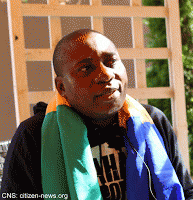
Akpobari Celestine, Ogoni community leader from Nigeria
(Image by CNS (Citizen News Service)) Details DMCA
Video interview with Akpobari Celestine is online at: https://www.youtube.com/watch?v=VhYUNvgJHGo
(CNS): Even as the 193-Member United Nations General Assembly formally adopted the 2030 Agenda for Sustainable Development on Friday the 26th of September 2015, Akpobari Celestine, an Ogoni born human rights activist, National Coordinator of Ogoni Solidarity Forum Nigeria and a member of the CSO Partnership for Development Effectiveness (CPDE) Post-MDG Working Group, echoed concerns of deepening inequality and the consequences of unrestricted business behaviour in his country in a conversation with Citizen News Service (CNS) in New York during the UN Summit for the Adoption of the 2030 Sustainable Development Agenda.
The world, according to Celestine, is divided into two -- developed and developing nations. Poor countries are increasingly being targetted as suppliers of cheap raw material to feed the industries of so called advanced economies only to produce finished products that will then be sold to the same developing countries but now with a sizeable profit. "The irony of it all is that we take away from those who have nothing, and give more to those who already have too much to begin with," Celestine said.
Inequality between and within nations
There is inequality between and within nations. Nigeria, one of the poorest nations in the world, is also home to billionaire Aliko Dangote whose net worth is estimated to be USD 18.3 billion. Celestine reminded us that while 2015 will be remembered for the launching of the global goals for sustainable development, it also marks the 20th death anniversary of the Nigerian writer and activist Ken Saro-Wiwa and 8 other Ogoni activists who were hanged by the then military government of Nigeria for campaigning against Shell Petroleum Development Company for the environmental destruction of Ogoniland.
Ogoniland is situated in Rivers state of Niger Delta. The Ogonis are an ethnic community, and the fertility of their land and rivers allows them to cultivate a self-reliant economy based on agriculture and fishing. But this situation changed radically when oil was discovered in the area in 1958, while Nigeria was still under British colonial rule. This discovery led to a partnership between Shell Petroleum Development Company and the Nigerian Government.
Even as Ogoni has yielded more than USD 30 billion in oil revenues, thirty years into this oil exploration has had a devastating effect on the environment, agriculture and the Ogoni way of life.
Irreparable damage to health and environment
(Note: You can view every article as one long page if you sign up as an Advocate Member, or higher).





